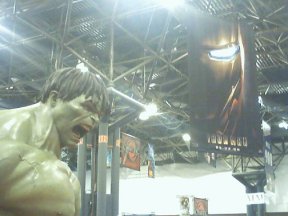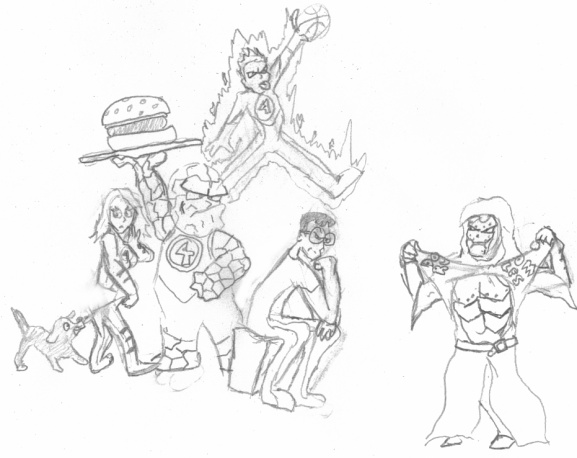
I Used to Love H.E.R.
December 8th, 2009 Posted by david brothersIn the end, 2009 is going to be the year that I stopped caring about superheroes.
As a kid, I loved them. Then I hit my teens and realized how bad they were and quit them. Then I came back to the US after high school, discovered Frank Miller’s Daredevil for the first time, and got back into them in a big way. Gimme everything you got about Spider-Man, Daredevil, and the X-Men. Add in some Flash, too. And now? Now, I’m bored and tired of them.
The straw that broke the camel’s back was when Dwayne McDuffie was fired off JLA after being hired, hamstrung, and toyed around with. Hiring McDuffie seemed like a no-brainer. He did a stellar job writing and managing an entire DC Universe, one that’s almost universally loved, and there’s no reason to expect that he wouldn’t bring that same magic to the comic series. Except he was hampered right out of the gate, forced to tie in with the wedding of two C-list characters, and then with every other DC event after that, including such unreadable crap as Tangent, Salvation Run, and Countdown. Then they started picking off team members. The most famous characters? Gone. Flash? Gone. Anyone you’d actually expect to see in a book called JLA? Gone. I’d mention Ed Benes’s art, but I think I’ve talked about him enough recently.
And then there’s the bit where DC made a big deal out of bringing Milestone into the DCU, only to flip the script and stick Static into a book that hasn’t been good in three (or more) years, shuffle the characters off into Brave & the Bold, and then step back like “Oh, we only wanted Static, anyway, you keep all them others.” In other words, “This guy made some other people a fat stack of cash, now we want that stack of cash.”
The thing about the JLA, DC, and McDuffie situation is that it is what is wrong with mainstream comics in miniature. It was an eye opener for me. What is important is not the stories, not growth or evolution, but the trademarks. The characters are what matter. As long as Hal Jordan makes a giant boxing glove and is the manliest man ever, as long as Superman has a spit curl, as long as Wonder Woman is in that stupid looking costume, things are okay. What is important is that books with these characters are on the shelves, because if they are on the shelves, they might get noticed, and if they get noticed, we get a movie or money or a game or something.
This year has seen Geoff Johns repeatedly trying to bring childhood nostalgia in line with adult sensibilities and cranking out books that explain why superheroes wear bowties or that feature dudes having sex with corpses. It’s scare quotes edgy, the sort of thing a teenager draws on a binder when he wants to rebel but isn’t sure how. Of course the love army are a bunch of shrill, possessive, needy women who don’t wear clothes. Of course these anger dudes just vomit blood uncontrollably. Doesn’t all this gore and sexiness makes these books grown up, instead of barely adolescent? Look at it, they’re drowning in it.
(Blackest Night is fundamentally stunted from a storytelling, emotional, and craft perspective.)
Brian Bendis and a few other Marvel writers spent a decent chunk of time this year hammering home the childishly binary view of “Villains kill, heroes don’t.” Meanwhile, their top villain was shooting passenger planes out of the sky, having government employees back handtrucks full of gold bars to known mass murderers and antisocial types, ordering assassinations of American and foreign citizens, and stocking the roster of a government agency with criminals who have pretended to reform. But hey, heroes don’t kill. They just kinda sit around and beat people up a little and sleep the sleep of the just. And in the opening pages of Marvel’s Siege, the newest big ticket crossover, Norman Osborn orchestrates the murder of sixty thousand people at a football game. But hey, in Siege #4, Spider-Man will punch him in the jaw, throw him in jail, and feel good about being a hero.
Have you ever seen the cover to Amazing Adult Fantasy #9, the series that eventually gave birth to Spider-Man? It’s a Steve Ditko joint, apparently. It’s got this giant monster with underpants, a helmet, and boots on, and the cover copy says “Ever since the dawn of time, nothing can match ‘THE TERROR of TIM BOO BA!'” Below that, the copy declares “The magazine that respects your intelligence!”
The Avengers books don’t respect your intelligence. It’s another entry in this absurd game of “Can you top this?” where the villains are getting exponentially more vile (Dr. Light goes from goof-off idiot to stone cold rapist to rape addict to a guy who is doing something vile off-screen to a recently murdered young girl’s skull, the villain of Blackest Night literally has sex with dead bodies because he’s ka-razy go coconuts, even though before he just kinda shot laser beams at people, Moonstone suddenly wants to put it on anything with a third leg when before she was just a scheming psychologist-type) and the heroes are… stuck in 1961.
Put plainer: Spider-Man could pull Norman Osborn’s whole head off at this point and it would be much, much better than watching him and his buddies circle jerk about how “heroes don’t kill.” Man up, you child.
Marvel and DC’s books, with a few notable exceptions, are ugly, stupid, cruel train wrecks that are busy trying to recapture past glories. I love Jimmy Palmiotti, Justin Gray, and Amanda Conner’s Power Girl, but for every one of those, you get a Ms. Marvel, a Mighty Avengers, and a JSA. For every New Mutants, you have to wade through Uncanny X-Men, Dark Avengers, and Flash Rebirth.
And I’m bored. I don’t care why Barry Allen wears a bowtie. That is the exact opposite of what I want to see in a comic book called Flash. I don’t want to see a villain who gropes corpses and has all the depth of the worst of a high schooler’s dirty drawings. I don’t want the fifth version of Superman’s origin to be told in ten years because who cares? Who wants to read this?
I’m bored to death. My pull list for singles is Amazing Spider-Man, Criminal: The Sinners, Hellblazer, King City, and Unknown Soldier. Everything else I either cop off the racks or follow in trade because it just isn’t worth picking up monthly.
I was thinking about this post while I was at work and went poking around for something. The last time I felt invested enough to write something positive about a Marvel or DC tights & fights book released this year, outside of linkblogging-related material, was September, when Black Cat returned to Amazing Spider-Man. I’ve made five negative posts about 2009-era superheroes since, and a whole bunch of posts about old superheroes or books from Viz, Boom! Studios, Image, Dark Horse, and other companies.
There are Marvel and DC cape books that I enjoy and purchase regularly. Spider-Man Noir was a great read and well worth the 15 bucks I spent on it. I like Eric Trautmann’s The Shield, Charlie Huston and Lan Medina’s Deathlok, the Fraction/Larocca Invincible Iron Man is aight, Rucka/JHW3 on Detective Comics is okay, Grant Morrison’s Batman & Robin is hilariously uneven… but by and large, I’m bored. I’m reading most of these in trades and I’m not reading B&R at all right now because Philip Tan is terrible.
Marvel and DC did a pretty good job of chasing me out of their universes. I didn’t even really notice it happening until it was done. They don’t want my money, and I’m not in their target audience, and I recognize that now. They’ve built a world that doesn’t interest me at all, and I’d be a fool to keep trying to force myself to care and be a part of that. Talking and blogging about it kept me in the world longer than I probably should’ve been, but I’ve finally learned.
So, like Tim and Chad and Geoff and Cheryl, I’m off that and looking for the next one. I’ll catch the good capery when it hits the trade, read books only when it’s clear the company cares as much about it as the creators do (i.e., no Peter David, Greg Land, Ed Benes, Tony Daniel, army of pencillers/inkers, crossover tie-ins, and so on), and keep on reading comics like I been doing.


